Disability Employment Case Study: Coffee for Good

Coffee for Good is not your ordinary gourmet coffee shop—the nonprofit provides on-the-job training for people with developmental disabilities.
Located in central Greenwich in the historic 1858 Mead House, Coffee for Good is open Monday through Saturday, from 7:30 am to 5:30 pm.
Mead House customers enjoy specialty coffees in the charming café, decorated by artwork created by artists from the Maggie Daly Arts Cooperative (operated by The Kennedy Collective).
The café offers a wide variety of coffees, cold brew, teas, smoothies, pastries, salads and sandwiches, making it an ideal destination at any time of day.
Voted Best Coffee Shop on the Gold Coast in 2023, 2024, and 2025, Coffee for Good’s primary mission is to provide skills training and confidence to adults with developmental disabilities and then to help them find local employment.
Trainees
Since opening in 2021, Coffee for Good has trained and placed over 30 trainee graduates into employment.
Coffee for Good trainees are paid the minimum wage plus a meal stipend. Training is individualized and typically lasts between six to 18 months.
Job candidates trained by Coffee for Good are one example of how qualified job seekers with disabilities can attain work readiness.
Trainees acquire the technical and professional skills and—most importantly—the confidence to attain jobs in their community.
Currently, Coffee for Good graduates are working at Aux Delices Café, The Bruce Museum, Chartwells (Wilton High School), Gregory’s Coffee, The Home Depot, Honey Joe’s Coffee, The Maritime Aquarium at Norwalk, Keough’s Hardware, The Millbrook Club, The Café at Greenwich Library, the YMCA-Greenwich, and the YWCA-Greenwich and Darien.
Job candidates trained by Coffee for Good are one example of how qualified job seekers with disabilities can attain work readiness and task-specific skills when an employer is fully engaged with an effective strategy.
Resources
There are many highly qualified job seekers with disabilities who may already have considerable education and experience that would enable them to fill a wide variety of positions, from the mail room to the C-suite.
However, otherwise qualified candidates often remain unemployed or underemployed due to employer prejudices, misperceptions, or uncertainty about how to effectively engage in recruiting, onboarding, and accommodation strategies.
There are resources available to break through those barriers, including Disability:IN Connecticut, a coalition of individuals and corporate partners that meets monthly to share best practices.
Otherwise qualified candidates often remain unemployed or underemployed.
An affiliate of Disability:IN, the organization focuses on tapping hidden talent and identifying qualified applicants with disabilities who might fill competitive employment openings at all levels of skill and experience.
Disability:IN Connecticut collaborates with other businesses, government organizations, and community service agencies to connect employers with sources of qualified job seekers with disabilities, changing attitudes and opening doors, figuratively and literally.
Employers achieve greater business success by facilitating participation and effective contributions from individuals with disabilities.
Adopting such enhanced workforce development strategies feels good, looks good, and most importantly, it is sound business strategy for employers, employees, customers, and communities.
For more information about Disability:IN CT, contact the organization’s executive
director, Sharon Denson (860.463.8050).
RELATED
EXPLORE BY CATEGORY
Stay Connected with CBIA News Digests
The latest news and information delivered directly to your inbox.



